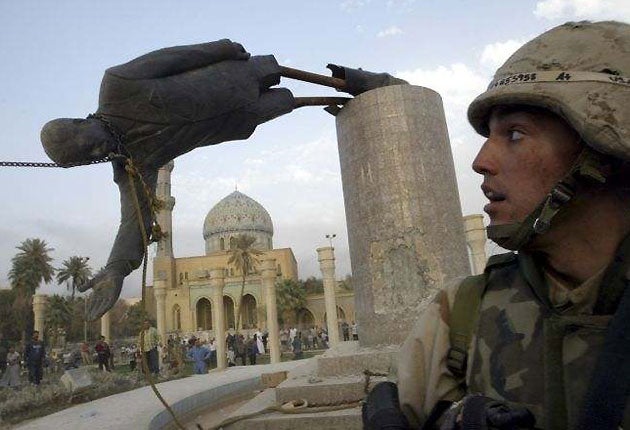'Too few funds' to rebuild Iraq, inquiry told

Britain’s role in the reconstruction of Iraq after the 2003 invasion suffered from shortages of funding and staff that hampered attempts to restore order, senior Foreign Office officials have said.
Despite declarations that Britain would lead an “exemplary” operation to bring back normality to the area around Basra, in the south of the country, the Chilcot Iraq inquiry heard that the demands of the task soon outstripped the money provided by the Government.
The revelations will heap further pressure on Sir John Chilcot’s inquiry team to call Gordon Brown, who then held the purse strings at the Treasury, to give evidence. A No 10 spokesman said that the Prime Minister has not yet been asked to appear, adding: “It is right that all the appropriate witnesses are asked to give evidence.”
Both Sir Peter Ricketts, a director in the Foreign Office between 2001 and 2003, and Edward Chaplin, then head of the department’s Middle East section, agreed that there was a shortage of the funds needed to carry out Britain’s reconstruction responsibilities in Iraq.
“I think we could have done with more resources to back up the ambition to play an exemplary role,” said Sir Peter, who is now the top civil servant at the Foreign Office. “As the requirement grew I think it outstripped the budget that had been foreseen. I think there was an underestimate of the number of people and the cost of the role that we found ourselves playing.” Asked his view on the problems in dealing with the aftermath of the invasion, Mr Chaplin said: “If your point is that the resources were never provided to make exemplary performance in our area of the south a reality, then you’re right, they weren’t.”
Ministers were briefed repeatedly throughout 2002 that managing post-war Iraq would be a major operation that needed further attention. “We warned ministers that this would be a long period of post-conflict work for the international community,” Sir Peter said. Mr Chaplin said that the need for post-war planning “was flagged up from an early stage” in memos drawn up by the Foreign Office in the Summer of 2002. “There was a risk of being stuck with responsibility for chronic instability.”
The pair described how officials in Whitehall were alarmed at the “dire” failure from the US to plan for the aftermath of the invasion. Mr Chaplin, who became the British ambassador in Baghdad in 2004, said that there was a “blind spot” in Washington over post-war planning. “They had a touching faith that once Iraq had been liberated from the tyranny of Saddam Hussein, everyone would be grateful and there would be parties in the street,” he said. The Foreign Office and ministers attempted to warn US colleagues that the view was “extremely optimistic”, but failed to change their plans. “These points were made at all levels, including and up to the Prime Minister talking to President Bush,” Mr Chaplin said. He listed a lack of coalition forces, the exclusion of the Sunni population from positions of power, and a failure to guard arms dumps as key factors leading to a major breakdown in basic law and order.
After the invasion, Sir Peter said that it soon became apparent that the Pentagon’s reconstruction unit, the Office of Reconstruction and Humanitarian Assistance (ORHA), was in chaos. Jack Straw raised concerns just a month after the invasion, while Tony Blair returned from a visit in June reporting that ORHA was “was a shambles”.
The inquiry also heard that a “small group of senior officials and military planners” was established in April 2002, almost a year before the invasion, to look at potential military action against Iraq.
Join our commenting forum
Join thought-provoking conversations, follow other Independent readers and see their replies
Comments